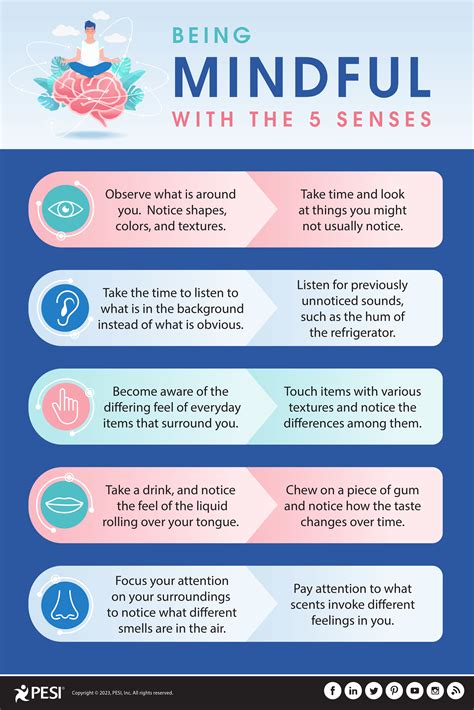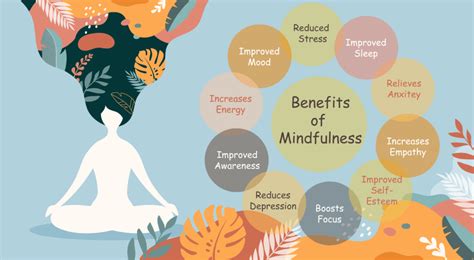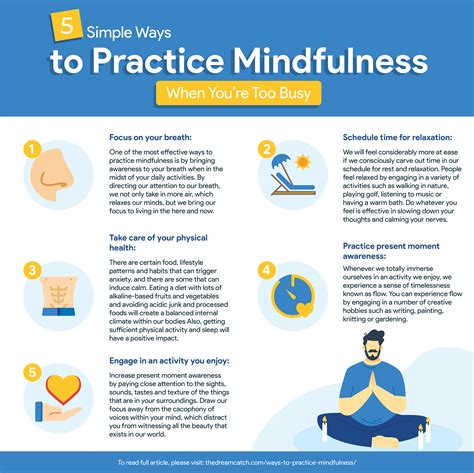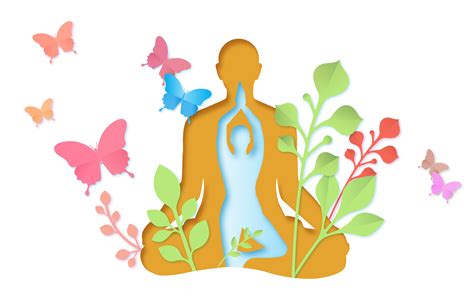Intro
Discover 5 ways to cultivate mindfulness, reducing stress and increasing self-awareness through meditation, breathwork, and intentional living, promoting emotional balance and mental clarity.
Being mindful is a powerful tool for improving our overall well-being and quality of life. In today's fast-paced world, it's easy to get caught up in the hustle and bustle of daily life and forget to take care of ourselves. Mindfulness is the practice of being present in the moment, paying attention to our thoughts, feelings, and sensations without judgment. By incorporating mindfulness into our daily routine, we can reduce stress, improve our relationships, and increase our overall sense of happiness and fulfillment.
Mindfulness is not just a practice, but a way of life. It's about being fully engaged in the present moment, without distraction or multitasking. When we're mindful, we're able to appreciate the small things in life, like the taste of a delicious meal or the sound of birds singing. We're also better able to manage stress and anxiety, as we're not getting caught up in worries about the past or future. By being mindful, we can cultivate a sense of calm and clarity, even in the midst of chaos.
The benefits of mindfulness are numerous and well-documented. Regular mindfulness practice has been shown to reduce symptoms of anxiety and depression, improve sleep quality, and even boost our immune system. Mindfulness can also improve our relationships, as we're more present and attentive to the people around us. By being fully engaged in the moment, we're able to communicate more effectively, listen more deeply, and respond more thoughtfully. Whether we're looking to reduce stress, improve our relationships, or simply feel more fulfilled, mindfulness is a powerful tool that can help us achieve our goals.
What is Mindfulness

Key Principles of Mindfulness
The key principles of mindfulness include: * Being present in the moment * Paying attention to our thoughts, feelings, and sensations without judgment * Being fully engaged in the present moment, without distraction or multitasking * Cultivating a sense of curiosity and openness * Being kind and compassionate towards ourselves and othersBenefits of Mindfulness

How Mindfulness Improves Mental Health
Mindfulness improves mental health by: * Reducing stress and anxiety * Improving mood and reducing symptoms of depression * Enhancing cognitive function, including attention and memory * Promoting emotional regulation and resilience * Increasing self-awareness and self-acceptance5 Ways to Practice Mindfulness

Tips for Incorporating Mindfulness into Daily Life
Here are some tips for incorporating mindfulness into daily life: * Start small, with just a few minutes of mindfulness practice each day * Be consistent, making mindfulness a regular part of your daily routine * Find a mindfulness practice that you enjoy, and that fits with your lifestyle and preferences * Use mindfulness apps or guided meditations to help you get started * Practice mindfulness with a friend or family member, to help keep you motivated and accountableOvercoming Obstacles to Mindfulness

Common Mindfulness Mistakes
Here are some common mindfulness mistakes to avoid: * **Trying too hard**: Mindfulness is not about achieving a specific state or goal - it's about being present in the moment, and allowing things to be as they are. * **Judging yourself or others**: Mindfulness is about cultivating a sense of kindness and compassion, rather than judgment or criticism. * **Getting distracted**: It's okay if your mind wanders - simply acknowledge the thought, and gently bring your attention back to the present moment. * **Not being consistent**: Make mindfulness a regular part of your daily routine, and try to practice at the same time each day.Mindfulness and Self-Care

Self-Care Practices to Support Mindfulness
Here are some self-care practices that can support mindfulness: * **Getting enough sleep**: Aim for 7-9 hours of sleep each night, and establish a consistent sleep routine. * **Exercising regularly**: Find a physical activity that you enjoy, and aim to exercise for at least 30 minutes each day. * **Eating a healthy diet**: Focus on whole, nutritious foods, and avoid sugary or processed snacks. * **Practicing self-compassion**: Treat yourself with kindness and compassion, and avoid self-criticism or judgment.Conclusion and Next Steps

To take your mindfulness practice to the next level, we recommend:
- Starting small: Begin with just a few minutes of mindfulness practice each day, and gradually increase your practice as you become more comfortable with the technique.
- Finding a mindfulness community: Connect with other mindfulness practitioners, either in person or online, to find support and motivation.
- Being consistent: Make mindfulness a regular part of your daily routine, and try to practice at the same time each day.
- Being patient: Remember that mindfulness is a practice, and it takes time and patience to develop. Don't get discouraged if you find it challenging at first - simply keep practicing, and trust that you will see benefits over time.
What is mindfulness and how does it work?
+Mindfulness is the practice of being present in the moment, paying attention to our thoughts, feelings, and sensations without judgment. It works by helping us cultivate a greater sense of self-awareness, reducing stress and anxiety, and improving our overall sense of well-being.
How can I incorporate mindfulness into my daily routine?
+You can incorporate mindfulness into your daily routine by starting small, with just a few minutes of mindfulness practice each day. Try practicing mindfulness at the same time each day, and find a mindfulness practice that you enjoy, such as mindful breathing or body scan.
What are the benefits of mindfulness and how can it improve my life?
+The benefits of mindfulness include reducing symptoms of anxiety and depression, improving sleep quality, and increasing our overall sense of happiness and fulfillment. Mindfulness can improve our relationships, help us manage stress and anxiety, and cultivate a greater sense of self-awareness and self-acceptance.
How can I overcome common obstacles to mindfulness, such as lack of time or difficulty quieting the mind?
+You can overcome common obstacles to mindfulness by starting small, finding a mindfulness practice that you enjoy, and being consistent. Remember that mindfulness is a practice, and it's okay if your mind wanders - simply acknowledge the thought, and gently bring your attention back to the present moment.
What are some self-care practices that can support mindfulness and improve my overall well-being?
+Self-care practices that can support mindfulness include getting enough sleep, exercising regularly, eating a healthy diet, and practicing self-compassion. Remember to treat yourself with kindness and compassion, and avoid self-criticism or judgment.
